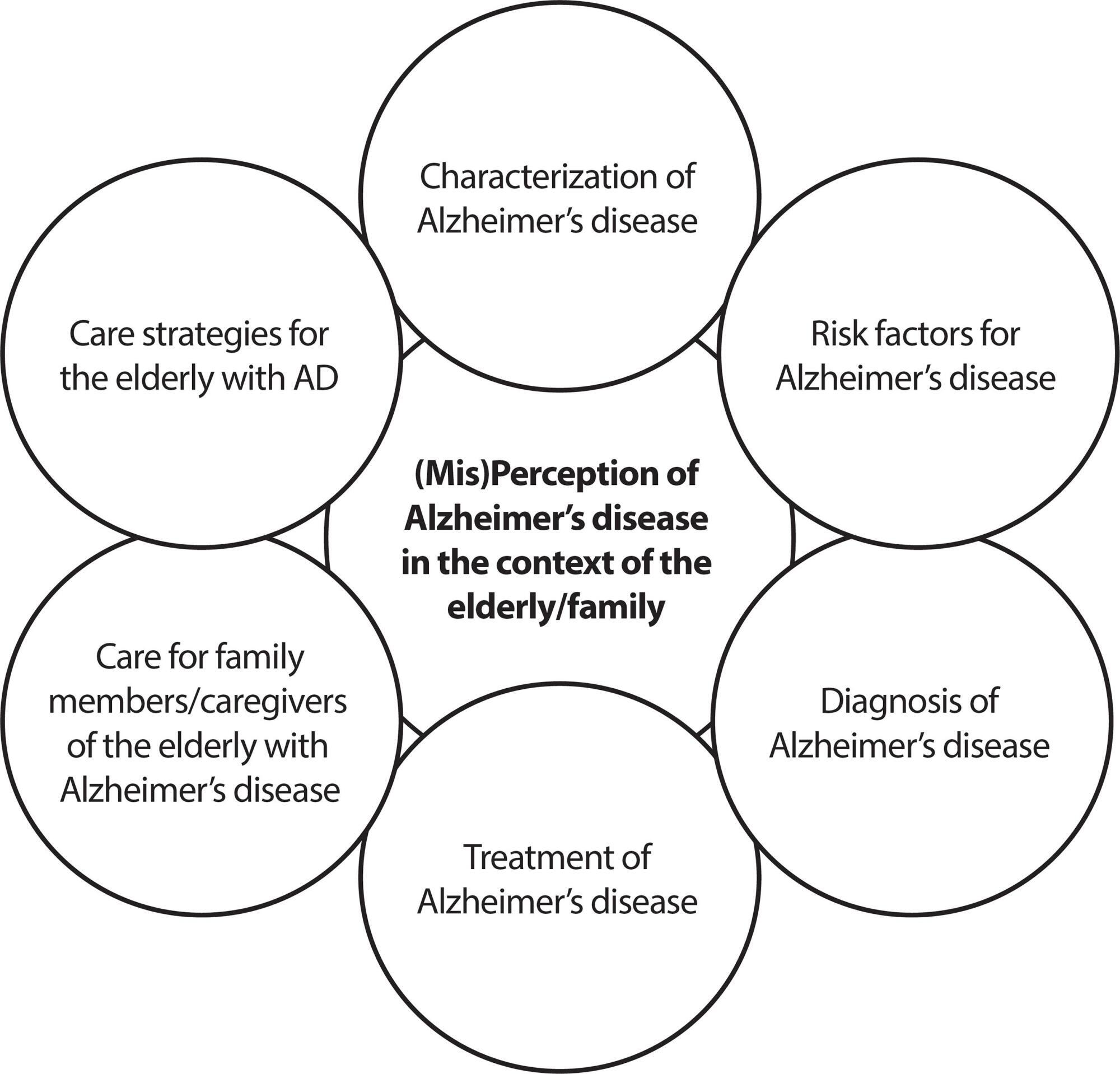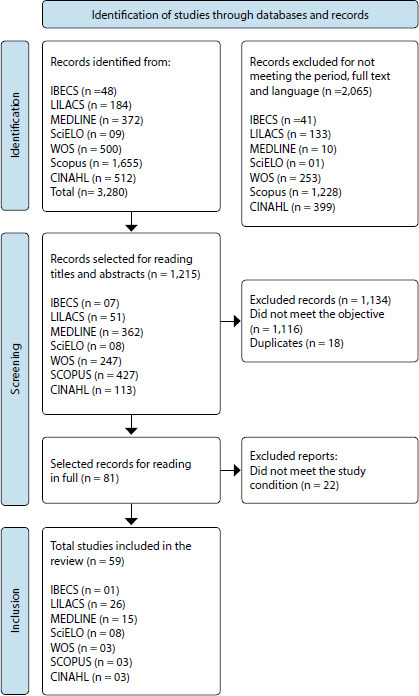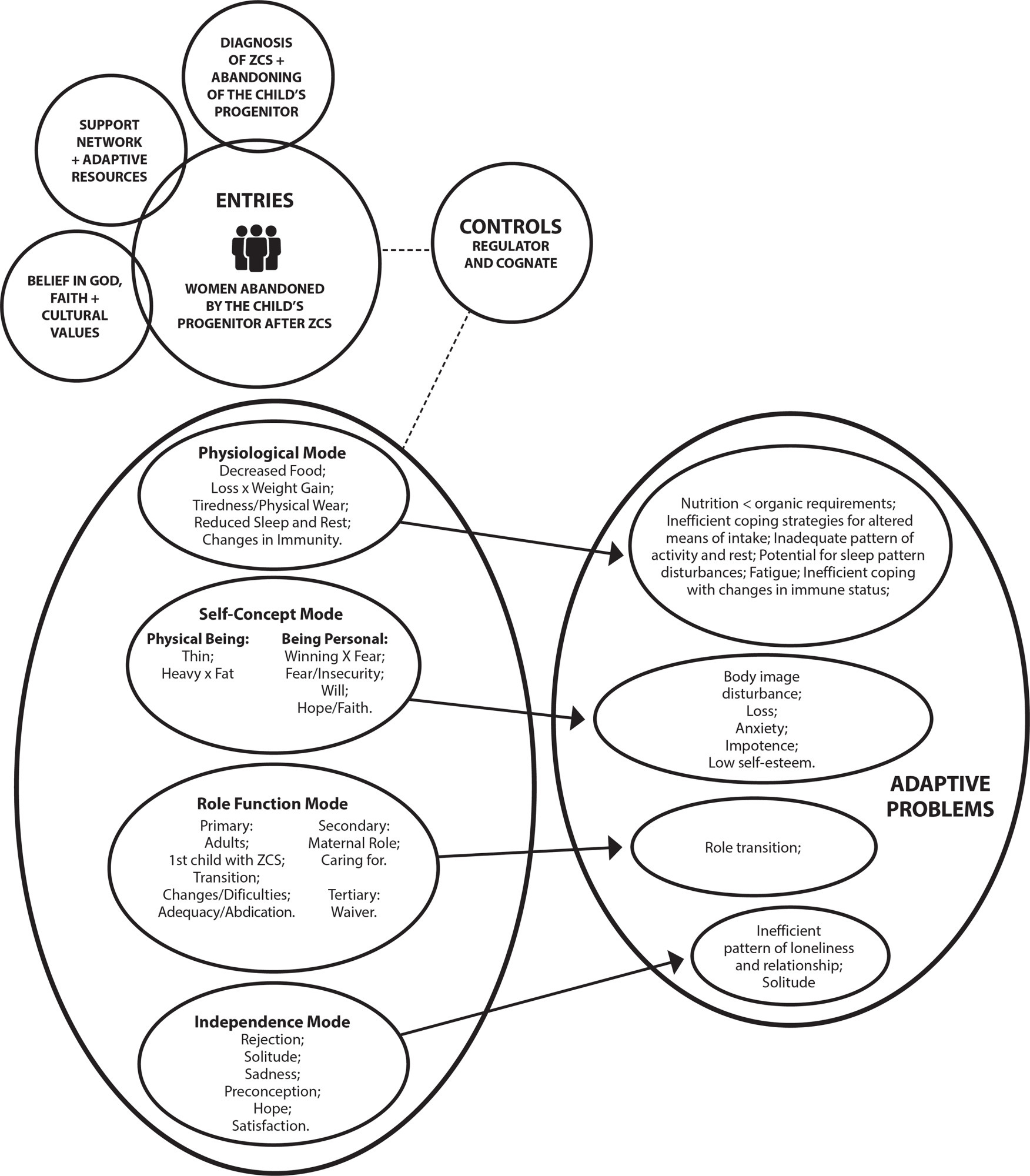-
01-01-2015
Quality of life and physical activity in intensive care professionals from middle São Francisco
Revista Brasileira de Enfermagem. 2015;68(1):26-31
Abstract
Quality of life and physical activity in intensive care professionals from middle São Francisco
Revista Brasileira de Enfermagem. 2015;68(1):26-31
DOI 10.1590/0034-7167.2015680104i
Views0See moreObjective:
the objective was to assess the level of physical activity (LPA) and the quality of life QL of the professionals who work in ICU.
Method:
this was a cross-sectional study carried out in Adult ICUs. LPA was assessed by the International Questionnarie of Physical Activity – short form (IQPA-SF) and the QL by the Medical Outcomes Study 36 (SF-36) questionnaire.
Results:
it was classified active 50.89% out of a total of 59 professionals. Nursing technicians were considered the most active with 60.6%. The QL of the professionals who were considered active were better when compared to inactives, with statistical differences to the category of physical aspects limitation, social aspects and mental health. The working hours were higher than recommend, the physicians were higher than the physical therapist, nurses and technicians nurses (p = 0.046).
Conclusion:
physically active professionals who work in ICU had higher quality of life probably why have lower hours of work and consequently more free time to engage in physical activity.

-
01-01-2015
Learning needs of Nursing students in technical vocational education
Revista Brasileira de Enfermagem. 2015;68(1):20-25
Abstract
Learning needs of Nursing students in technical vocational education
Revista Brasileira de Enfermagem. 2015;68(1):20-25
DOI 10.1590/0034-7167.2015680103i
Views0See moreObjective:
identify learning needs of students of Technical Vocational Education (TVE) in Nursing. Qualitative study conducted in a city of São Paulo state.
Method:
the subjects were students, teachers and coordinators of TVE and students of the bachelor degree who have had contact with TVE. Data collection was performed by questionnaire socioeconomic and cultural circles about the learning needs. For data analysis we used the content analysis.
Results:
it was found that students have difficulties contents not related to nursing as portuguese and mathematics, as well as introductory courses in the course of TVE which possibly may interfere negatively in learning specific content of nursing and the quality of health care.
Conclusion:
it is necessary to rethink the content taught and ways to teach from basic education, as well as the training of teachers who now works in the TVE.
-
01-01-2015
Serious game e-Baby: nursing students’ perception on learning about preterm newborn clinical assessment
Revista Brasileira de Enfermagem. 2015;68(1):13-19
Abstract
Serious game e-Baby: nursing students’ perception on learning about preterm newborn clinical assessment
Revista Brasileira de Enfermagem. 2015;68(1):13-19
DOI 10.1590/0034-7167.2015680102i
Views0See moreObjective:
to evaluate students opinion regarding e-Baby educational technology.
Methodology:
exploratory descriptive study in which participated a sample composed of 14 nursing Portuguese students that used e-Baby digital educational technology in an extracurricular course. To achieve the aim of the study, the data collection was realized through an opinion instrument in Likert scale including the possibility of commentaries by students. Is was also collected data of participants’ characterization.
Results:
students made very satisfactory evaluations regarding the game e-Baby, varying since usability acceptation through suggestions of expansion of the game to other nursing themes.
Conclusion:
serious game e-Baby can be considered a didactic innovation and motivator tool of learning. Besides, it demonstrates have adequate interface in design and educative function aspects, evocating intense interaction between user and computational tool.

-
01-01-2015
Challenges beyond the scientific knowledge production
Revista Brasileira de Enfermagem. 2015;68(1):7-8
Abstract
Challenges beyond the scientific knowledge production
Revista Brasileira de Enfermagem. 2015;68(1):7-8
DOI 10.1590/0034-7167.2015680101p
Views0For several decades, innumerous appeals and reflections on how to build the nursing science and achieve visibility in the scientific world led researchers to make efforts to produce knowledge that contributed to the well-being of people, improving their quality of life, relieving their suffering and transforming the reality in which we live. In addition to […]See more
-
ORIGINAL ARTICLE07-13-2020
Awareness raising workshop for nursing students on the elderly with Alzheimer’s disease: contributions to education
Revista Brasileira de Enfermagem. 2020;73:e20190021
Abstract
ORIGINAL ARTICLEAwareness raising workshop for nursing students on the elderly with Alzheimer’s disease: contributions to education
Revista Brasileira de Enfermagem. 2020;73:e20190021
DOI 10.1590/0034-7167-2019-0021
Views1See moreABSTRACT
Objective:
To describe the contribution of an awareness-raising workshop for nursing students on Alzheimer’s disease in the context of the elderly/family.
Methods:
Strategic action-research developed with 15 university students from the sixth to the eighth semester of Nursing at a university institution in the Rio Grande do Sul. The data collected through semi-structured interviews, before and after an awareness-raising workshop on Alzheimer’s disease in elderly/family, were subjected to thematic content analysis.
Results:
Six categories were identified that concern (Mis) perception of Alzheimer’s disease in the context of elderly/ family, from the characterization; risk factors; diagnosis; treatment of Alzheimer’s disease; from care to family members/caregivers; and care strategies for the elderly with Alzheimer’s disease.
Conclusion:
The awareness-raising workshop enabled the students to broaden and deepen the knowledge on the theme of Alzheimer’s disease in the elderly.

-
ORIGINAL ARTICLE09-23-2022
Analysis of the concept of cardiovascular risk: contributions to nursing practice
Revista Brasileira de Enfermagem. 2022;75(4):e20210803
Abstract
ORIGINAL ARTICLEAnalysis of the concept of cardiovascular risk: contributions to nursing practice
Revista Brasileira de Enfermagem. 2022;75(4):e20210803
DOI 10.1590/0034-7167-2021-0803
Views0See moreABSTRACT
Objectives:
to analyze the concept of cardiovascular risk to support nursing practice.
Methods:
this is an analysis to define the concept of cardiovascular risk, through the use of eight steps of Walker’s and Avant’s framework, using a literature review in indexed scientific journals.
Results:
cardiovascular risk is defined in a broad and original way as a context of health and nursing care that makes it possible to identify modifiable (cardiometabolic, behavioral, psychosocial, cultural and occupational) and non-modifiable (biological) risk factors for cardiovascular diseases that act as early and interrelated markers, of multiple and heterogeneous etiology, predisposing to cardiovascular vulnerability.
Conclusions:
with the analysis and definition of the concept of cardiovascular risk, we realized that it will be possible to base nursing practice, with implications in clinical practice for identifying and reducing risk factors for cardiovascular diseases, with nursing relevance in the care of these subjects.

-
REFLECTION11-11-2020
Children with special needs in health: challenges of the single health system in the 21st century
Revista Brasileira de Enfermagem. 2020;73:e20190037
Abstract
REFLECTIONChildren with special needs in health: challenges of the single health system in the 21st century
Revista Brasileira de Enfermagem. 2020;73:e20190037
DOI 10.1590/0034-7167-2019-0037
Views0See moreABSTRACT
Objective:
Reflect on the gaps in the care of Children with Special Needs in Health that demand complex clinical care with dependence on technological support for the maintenance of life, in the Unified Health System.
Methods:
This is a reflection study based on recent policies and literature related to the theme.
Discussion:
Despite the advances achieved with the Unified Health System with regard to access to health services and the expansion of Primary Care, with the aim of reorienting health, it can be said that the health care model for CSHCN in Brazil is still centered on the hospital and medical knowledge.
Final considerations:
There are gaps in the policies for children aimed at the new paediatric profile, and little is discussed about its implications for the Unified Health System.
-
ORIGINAL ARTICLE10-21-2019
Being an institutionalized elderly person: meaning of experiences based on Heidegger’s phenomenology
Revista Brasileira de Enfermagem. 2019;72(6):1632-1638
Abstract
ORIGINAL ARTICLEBeing an institutionalized elderly person: meaning of experiences based on Heidegger’s phenomenology
Revista Brasileira de Enfermagem. 2019;72(6):1632-1638
DOI 10.1590/0034-7167-2018-0763
Views0See moreABSTRACT
Objective:
Analyze the meaning of being an elderly person living in a long-term institution.
Method:
Qualitative study based on Martin Heidegger’s thought. Twelve phenomenological interviews were conducted with people aged over 60 years living in a long-term institution for the elderly in the city of Itabuna, Bahia, Brazil.
Results:
The units of meaning identified were: experience of progressive loss of autonomy and independence, perception of living in an institution as an inevitable circumstance; and being-with becoming being-alone/being-lonely. After the identification of ontic aspects and hermeneutical understanding, the unit of meaning was constructed: meaning of being an elderly person living in a long-term institution.
Final considerations:
The ontological needs referring to being an elderly person remain forgotten. As we are ontic and ontological, limited care to the ontic instance indicates deficiencies in institutionalization. Improvements are required to ensure the right to age with quality of life to this population.
-
ORIGINAL ARTICLE09-21-2020
Adaptive problems arising out of the progenitor’s abandonment after Zika Congenital Syndrome
Revista Brasileira de Enfermagem. 2020;73:e20190602
Abstract
ORIGINAL ARTICLEAdaptive problems arising out of the progenitor’s abandonment after Zika Congenital Syndrome
Revista Brasileira de Enfermagem. 2020;73:e20190602
DOI 10.1590/0034-7167-2019-0602
Views0See moreABSTRACT
Objective:
to reveal the adaptive problems of the woman abandoned by the child’s parent after Congenital Zika Syndrome, in the light of Roy’s Adaptation Model.
Method:
a qualitative, descriptive study, based on Roy’s Adaptation Model, developed with six women abandoned by their child’s parent after Zika Congenital Syndrome diagnosis, through interview and Content Analysis technique.
Results:
adaptive problems appeared in nutrition, activity, rest, and protection patterns, due to limitations in self-care; self-concept, related to dissatisfaction with body image and personal being; in the role of transition role, through difficulties in taking over new roles and in interdependence, related to changes in affective needs.
Final considerations:
the overload of care for children with Congenital Zika Syndrome, added to the challenges of the abandoned woman by her child’s parent, led to adaptive problems, showing their main difficulties of coping.

-
REVIEW04-16-2021
Nursing assistance in patient care with external ventricular drain: a scoping review
Revista Brasileira de Enfermagem. 2021;74(2):e20190796
Abstract
REVIEWNursing assistance in patient care with external ventricular drain: a scoping review
Revista Brasileira de Enfermagem. 2021;74(2):e20190796
DOI 10.1590/0034-7167-2019-0796
Views0See moreABSTRACT
Objectives:
to map the available evidence about nursing care aimed at adult patients using external ventricular drain.
Methods:
this is a review using the scoping review method.
Results:
Initially, 965 studies were identified and, after the eligibility criteria, a sample of 54 publications was obtained. Each of them was assessed according to GRADE, resulting in three studies with high quality; 14 with moderate quality; 32 with low quality; and five with very low quality. It was highlighted 20 nursing care subdivided into nine categories, namely: drainage system; bed positioning and mobilization; catheter care; monitoring of intracranial pressure; and medication administration.
Conclusions:
the scoping review made it possible to identify the main nursing care directed to adult patients undergoing placement of external ventricular drain from the evidence available to date.

-
ORIGINAL ARTICLE10-21-2019
Multidisciplinary team actions of a Brazilian Psychosocial Care Center for Alcohol and Drugs
Revista Brasileira de Enfermagem. 2019;72(6):1624-1631
Abstract
ORIGINAL ARTICLEMultidisciplinary team actions of a Brazilian Psychosocial Care Center for Alcohol and Drugs
Revista Brasileira de Enfermagem. 2019;72(6):1624-1631
DOI 10.1590/0034-7167-2018-0760
Views0See moreABSTRACT
Objective:
to investigate the criteria used by health professionals to identify the phase of consumption of alcohol and drug users, and actions directed to their care.
Method:
a qualitative study developed with 14 professionals from a Brazilian Psychosocial Care Center for Alcohol and Drugs (Centro de Atenção Psicossocial Álcool e Drogas) based in the south of the country. Data were collected in June 2017 through semi-structured interviews and then submitted to thematic analysis.
Results:
the criteria used by the professionals were: periodicity of use; amount and type of drug used; repercussions of misuse; and place that the drug occupies in the person’s life. The actions developed were orientation and referral to support groups, therapeutic workshops and individual care.
Final considerations:
the chronic nature of alcohol/drug use/dependence requires specific care in each phase, and objective criteria to identify and intervene in early phases, aiming at the prevention of chemical dependence.
-
06-11-2021
Resilience in elderly people: factors associated with sociodemographic and health conditions
Revista Brasileira de Enfermagem. 2021;74:e20200171
Abstract
Resilience in elderly people: factors associated with sociodemographic and health conditions
Revista Brasileira de Enfermagem. 2021;74:e20200171
DOI 10.1590/0034-7167-2020-0171
Views0See moreABSTRACT
Objective:
to describe the sociodemographic and health characteristics of elderly people, measure the score of total resilience and by sex and verify the association of sociodemographic and health variables with total resilience and by sex.
Methods:
this is a household survey with 808 elderly people, assessed by validated instruments. Student’s t test and multiple linear regression (p<0.05).
Results:
most were female, 60|-|79 years old. The total resilience score was 78.06, for men 81.53 and for women, 76.32. Total resilience was associated with males; positive self-perceived health; greater participation in Advanced Activities of Daily Living; fewer morbidities; absence of depressive symptoms. Among men and women, resilience was associated with greater participation in Advanced Activities of Daily Living and absence of depressive symptoms and, specifically, among women, positive self-perceived health.
Conclusion:
these results contribute to nursing care, aiming to encourage resilience.
Search
Search in:
Nuvem de Tags
Adolescente (85) Atenção Primária à Saúde (239) COVID-19 (91) Criança (91) Cuidados de Enfermagem (269) Educação em Enfermagem (151) Educação em Saúde (139) Enfermagem (930) Enfermagem Pediátrica (86) Estudantes de Enfermagem (77) Estudos de Validação (131) Família (87) Idoso (208) Promoção da Saúde (99) Qualidade de Vida (104) Saúde do Trabalhador (86) Saúde Mental (145) Saúde Pública (82) Segurança do Paciente (150) Tecnologia Educacional (100)



